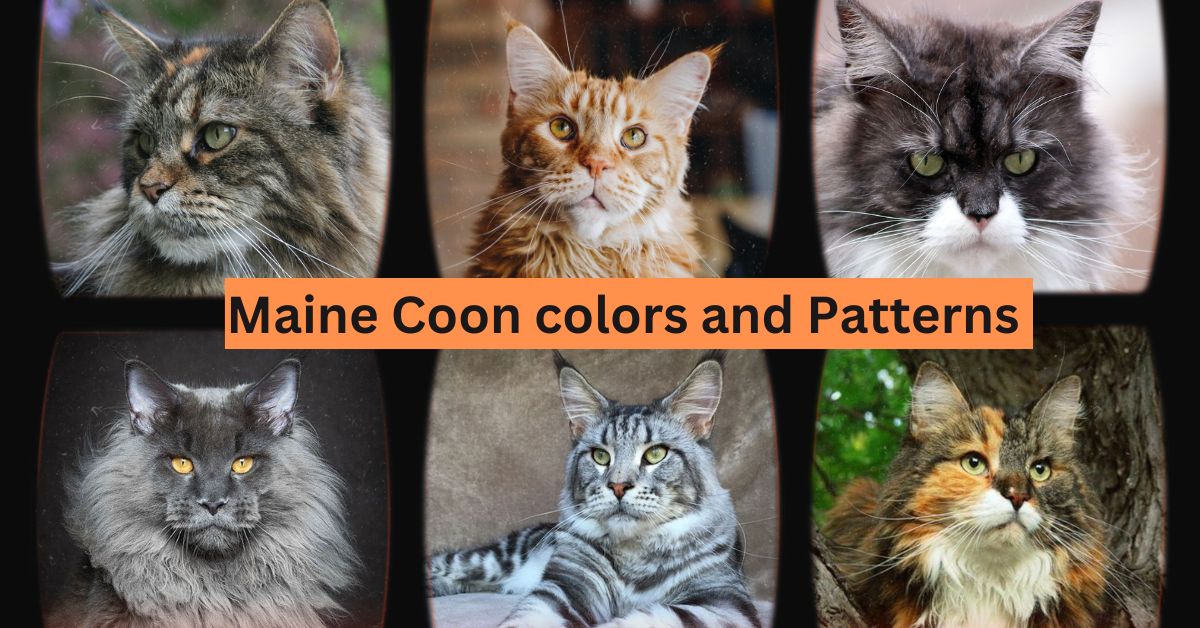Maine coon colors have a very wide range from classic tabby to rare solid colors. Their fabulous fluffy coat or different patterns make them popular among cat lovers.
This article will dive into the many Maine coon colors with pictures. Read this entire article to understand their stunning patterns or shades better.
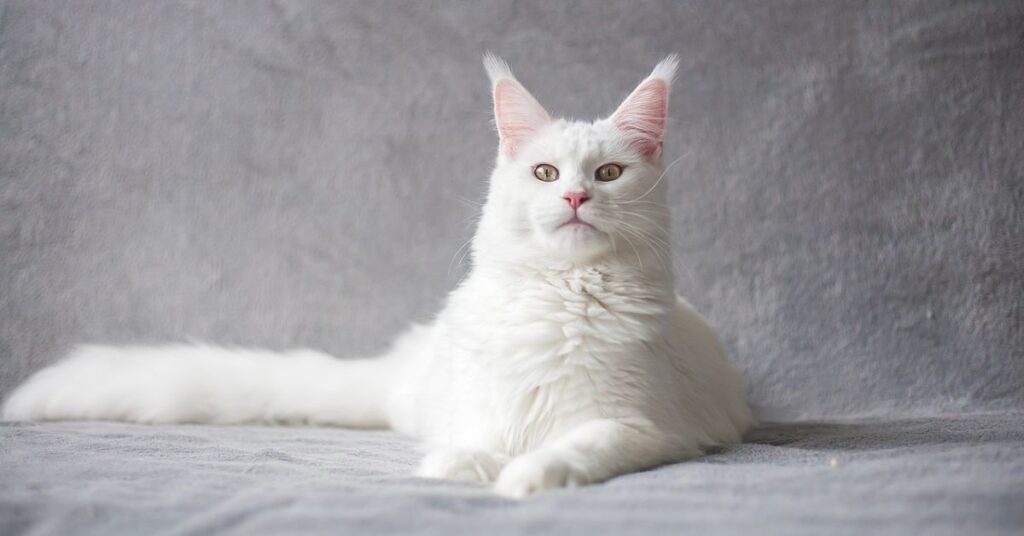
Origins and Characteristics
Maine coon cats were recognized in the 19th century in the beautiful city of Maine in the United States. They survived very easily in the harsh cold atmosphere there due to their thick and long fur. Due to their excellent hunting skills, they were kept to protect their crops from rodents.
Maine coon cats are gentle giants with a loving nature whose friendly nature and large size make them look like dogs. Their beauty includes the long tufts on their ears, giving them a royal look. They also have hair on their paws to protect them from the cold in snowy areas.
| Trait | Description |
|---|---|
| Appearance and Size | Males weigh: 12-18 pounds Females weigh: 8-12 pounds Height in Males: 10-16 inches Height in Females: 8-14 inches |
| Personality | Calm, Friendly, Loyal, and Gentle |
Maine Coon Colors
Maine Coon cat colors and patterns have a wide and unique range of shades that are loved by cat lovers all over the world. According to the International Cat Association (TICA) and Cat Fanciers’ Association (CFA), there are approximately 80 coon colors and patterns available, each with its unique shade or fur quality.
These include:
| Color Variety | Description |
|---|---|
| Solid Colors | Maine Coons come in plain hues like as black, white, blue, red, and cream. These hues give them an exquisite, timeless appearance. |
| Tabby Patterns | Tabby patterns like classic, mackerel, and spotted are quite popular. These patterns provide them with a natural, camouflage-like appearance. |
| Parti-Color | Maine Coons come in plain hues like black, white, blue, red, and cream. These hues give them an exquisite, timeless appearance. |
| Bicolor and Tricolor | Maine Coons have stunning bicolor or tricolor patterns. These designs frequently combine white and another color or blend many colors. |
Maine Coon cats come in many stunning color variations, each with its charm. The stripes and markings they display depend on their genetics. From the shining coats of solid black and white Maine Coon cats to the tabby stripes, their massive size makes them a true companion.
Solid Colors: Regal Elegance
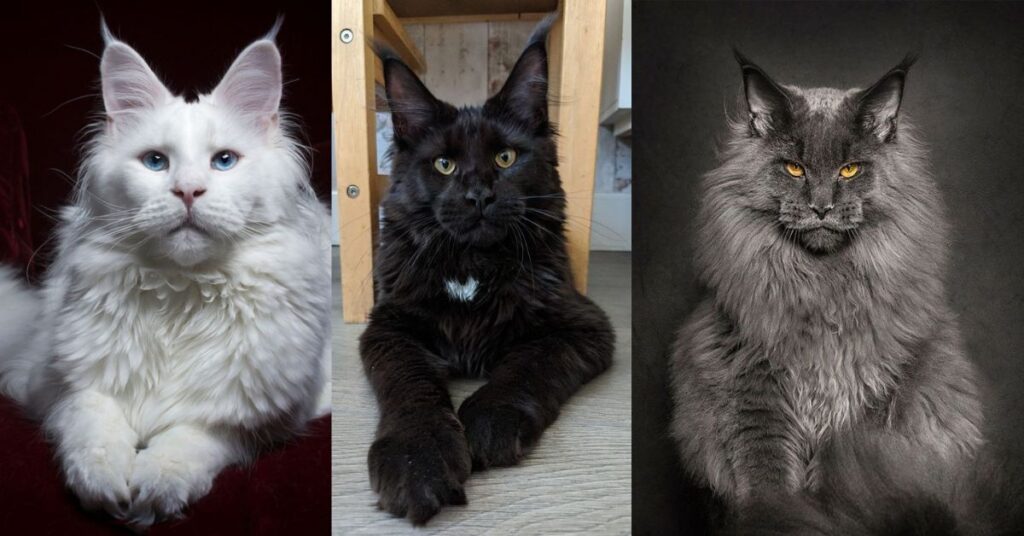
The sophisticated and timeless look of solid color Maine Coon cats captivates everyone. White and black Maine Coon cat colors are more popular. They have a single solid color which is from their neck to tail. The long fur on the neck is also solid. Apart from this, the skin color of their paws can be from light pink to dark gray.
Tabby Patterns: A Camouflage of Beauty
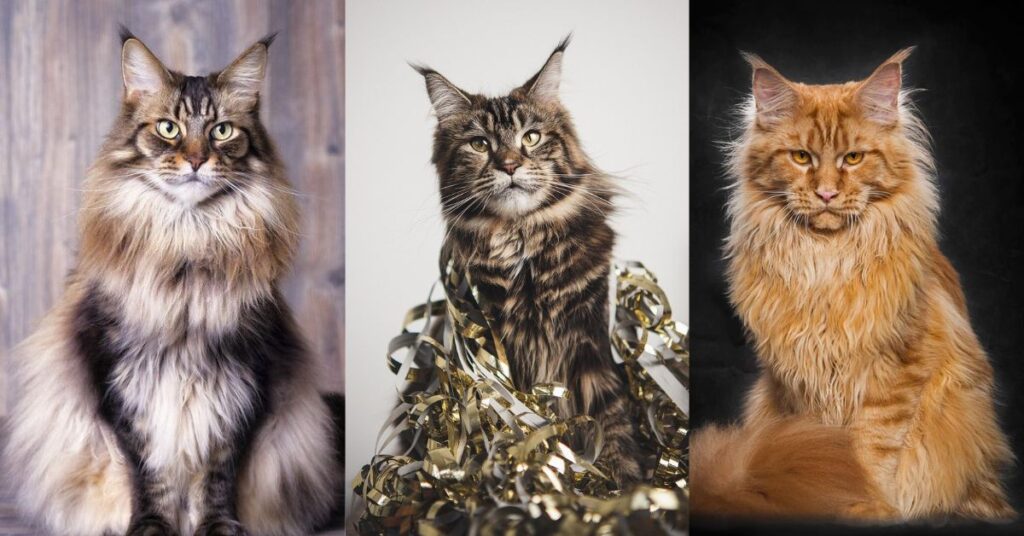
This classic coon features tabby stripes that add depth and intensity to their coats. These tabby stripes can follow many different shades and patterns, from dark spots to lighter-rounded stripes that add to the beauty of the tabby blend.
| Solid Color Maine Coons | Tabby Pattern Maine Coons |
|---|---|
| Black | Mackerel |
| White | Classic |
| Silver or Grey | Spotted |
Rare Maine coon colors
It is known for its common color but there are many rare shades. These rare Maine coon colors are fascinating felines among cat enthusiasts and breeds.
The chinchilla Maine Coon has a silver-tipped coat which is soft and shiny and is not easily available, so it is a bit rare. Similarly, the tortoiseshell Maine Coon with a mixture of orange, cream, and black colors also comes in rare Maine coon colors due to its stunning beauty. The calico Maine coon cat is also considered rare.
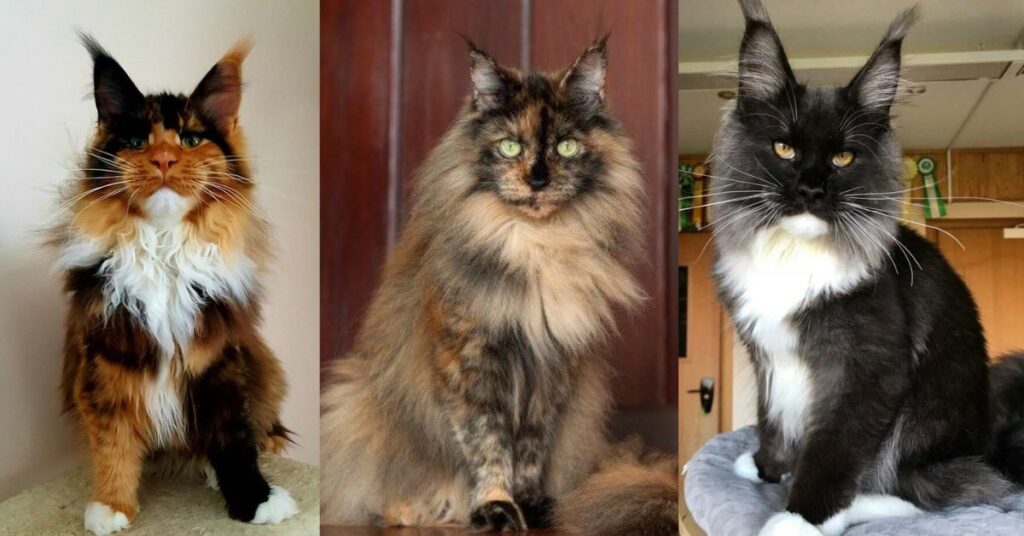
These rare colors and traits are a huge contribution of breeders who breed cats with two special genetics, which is how we get to see Maine Coons with these majestic coats.
Detailed Explanation of Color Genetics
Their elegant colors and patterns are due to the genes they carry from their parents. All Maine Coon cats have different genes, which gives them coats of different shades and colors.
The Science Behind Their Patterns
Their genetics are responsible for the colors of maine coon cats which controls the pigment of their fur. This biological pigment is mainly Melanin.
- Melanin is divided into two types Eumelanin and Phaeomelanin.
Eumelanin is responsible for giving black and brown colors to the organism such as hair, skin, and eye color.
Phaeomelanin is responsible for giving red, yellow, and cream colors. These pigments give their fur patterns and colors, whether they are solid shades or stripes. In darker Maine Coon cats, eumelanin dominates, which balances the genetic factors for dark solid colors or stripes.
- The dominant/recessive character of some genes determines the primary color, resulting in solid or bicolor patterns.
- The dilution gene lightens or softens colors, resulting in pastels.
- The agouti gene induces hair banding, which results in tabby patterns.
Caring and Grooming of Maine Coon Cats
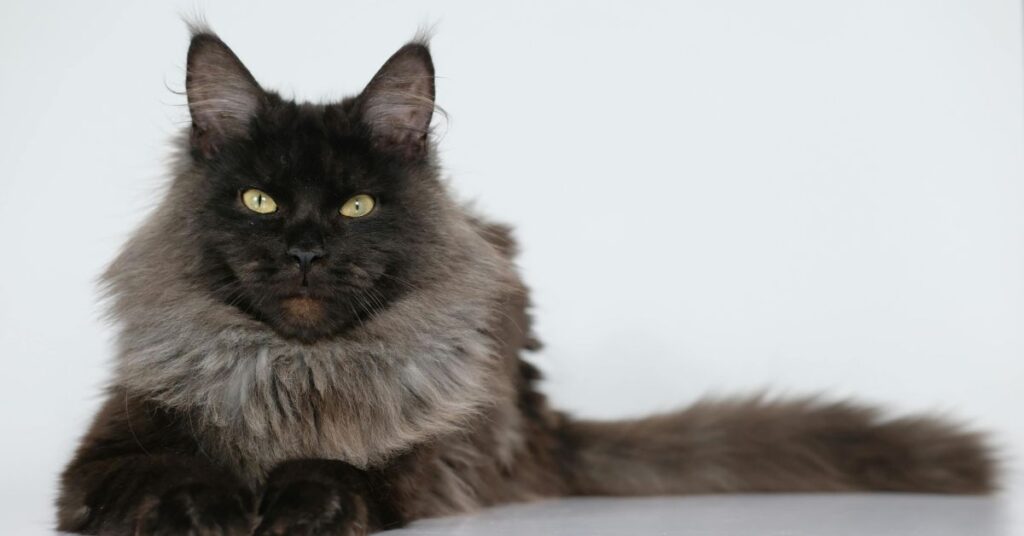
They require special attention to maintain their majestic fur and health. Maine Coons require less grooming than Persian and Himalayan cats. They also shed their fur which requires regular brushing.
Brushing
Most cats clean their fur by licking it which is their natural behavior. During shedding, a lot of dead hair can enter their stomach which can cause problems like hairballs. Brushing 2 to 3 times a week should remove dead hairs so that their coat does not get matted.
- Use a vet-recommended cat shampoo. Avoid using human shampoo as it can dry and damage their skin.
- Use a brush with soft bristles.
Nails and Air Cleaning
The sharp nails of Coon cats need regular trimming. They scratch all the surfaces of the house to trim their nails. To avoid this, you can give them a scratching post which will keep their nail healthy and will also help them stretch their body.
| Grooming | Frequency |
|---|---|
| Bathing | Every 4-6 weeks |
| Brushing | 2-3 times per week |
| Nail Trimming | Every 2-4 weeks |
| Ear Cleaning | Once a month |
There are high chances of getting infections and air mites due to dust entering their beautiful tufted ears. To avoid this, their ears should be cleaned regularly with a wet cloth or cotton swab. You can also use cat ear solutions after consulting your veterinarian.

I am Saral Kumar, a passionate blogger who dedicates my time to providing valuable information on pet care, especially cats. I create content that helps cat owners to understand their furry friends better and take care of them. I have spent the last decade trying to understand cats better. So I am sharing my valuable insights and tips with my fellow cat enthusiasts through writing.
